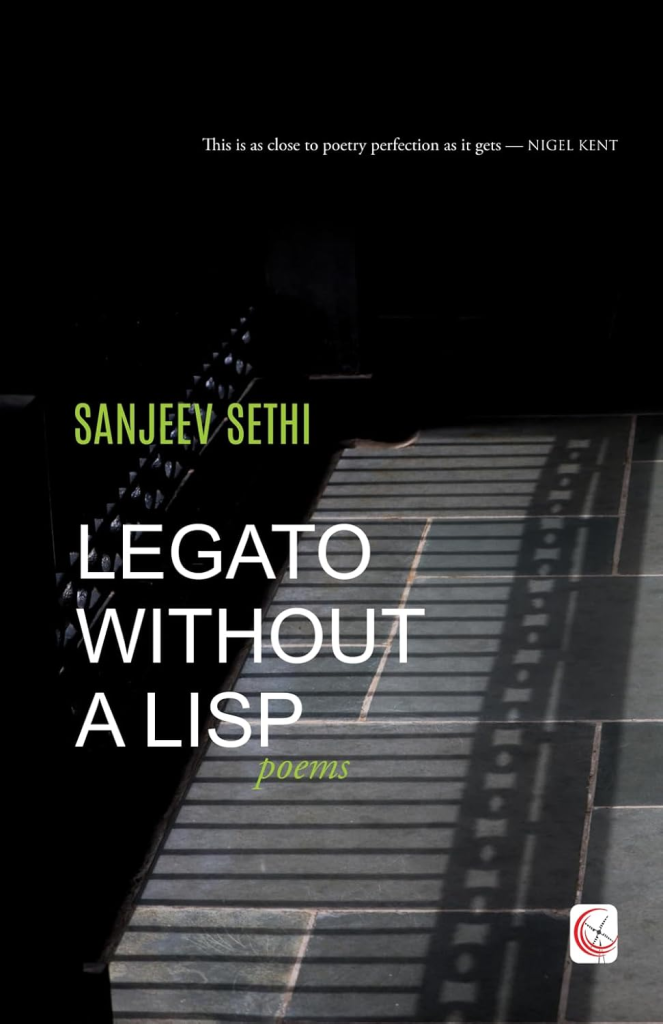
A gentle tone from an angel megaphone
Sanjeev Sethi’s latest full length collection of poetry, Legato without a lisp, is a work of exemplary fullness. A fullness of language and of intention. Comprising a collection of works rendered by a poet sure of his abilities and expression, it comes in its sheer robustness into an era marked by frail superficiality. Legato without a lisp is projected in its fullness to stand apart from the mere apparitions of art, those things that shout but barely speak, that garble as they scream with nothing to say. This is not at all in their company. This is a work solid and tangible.
It begins at the level of the line. Each feeling fully formed as though pulled from some remarkable ether and yet each line comes together, cobbled together with striking unity. Poetry born both together and apart. ‘Menarche left its mark/on your left leg’ – from Adolescence and ‘The meter of mederation fails/to direct my dinghy. A sneeze’ – from Effectuation are two such examples. This language, while transformative in its solidity, is not forceful, not violent but inviting, wise and open in its delivery. At times it almost comes like a sermon, Sethi pronouncing from his pulpit, tome in hand, somehow quiet yet booming. A gentle tone from an angel megaphone. A sound that does not speak with reluctance but with vigour.
All this is not to say that it does not have its moments of playfulness and humour. When the humour does come it comes with wit and with a sense of play that eschews the tired figure of the overly serious and dull artist. In passages such as ‘In Meatspace, we meet slices, too’ – from Rifeness, Sethi shows he’s not afraid to have fun. So too in the exemplary rhythms of the poems. They roll by on the gentle musicality, freely played with but always disciplined enough to not crumble into sing-song emptiness. You never get the manipulative feeling of being dragged into another’s song but feel compelled to sing along with Sethi’s gentle tune. ‘Do you know of anyone who dickers/with destiny? Meet the unsexed who,/like everyone, breathe some/more, and leave without a forwarding/address – from Olio, illustrated Sethi’s mastery of the rhythmic form.
The poems themselves are concerned with the movements of life, the chronological and the appreciative frozen moments where lyric poetry of this quality is born. At times political, at times gently instructive, at times traversing memory that concretes the past rather than descending into sentimental nostalgia. This shapes a world removed from attempts at the homogeneous universal and into the individual. The abstraction of the personal, the subjective waltz of place and time. One gets the feeling that Sethi has a mind for pondering the small moments of life and taking from them something entirely individual. These are not the rehashed platitudes of the churned out postcard poignancy of so much modern poetry. These stand alone. When Sethi writes lines like ‘Mortality forwards its memo,/through a long-lost friend./Senectitude wrests my mentor/and I am quietened by lines left by him;/as an impulse larger than me/chooses to triturate my ego’ – from Au Revoir, you sense his authorial presence in each utterance. He is not interested in the familiar, only in what he can grasp from life through his art.
Legato without a lisp is a book well worth the time. As an art object, it stands as a physical structure against the tide of so much that withers and falls, weak work created with so little thought apart from the on-trend and the easily consumable. Work that it is made to be quickly exhausted and disappear. Work that has no physicality and cannot stand. Sanjeev Sethi has here created a work that wishes to stand, that demands to be remembered. What more could one ask?
Nathan Anderson is a poet and artist from Mongarlowe, Australia. He is the author of numerous books and has had work appear widely both online and in print. He is a member of the C22 experimental writing collective. You can find him at nathanandersonwriting.home.blog or on Twitter/X/Bluesky @NJApoetry.
